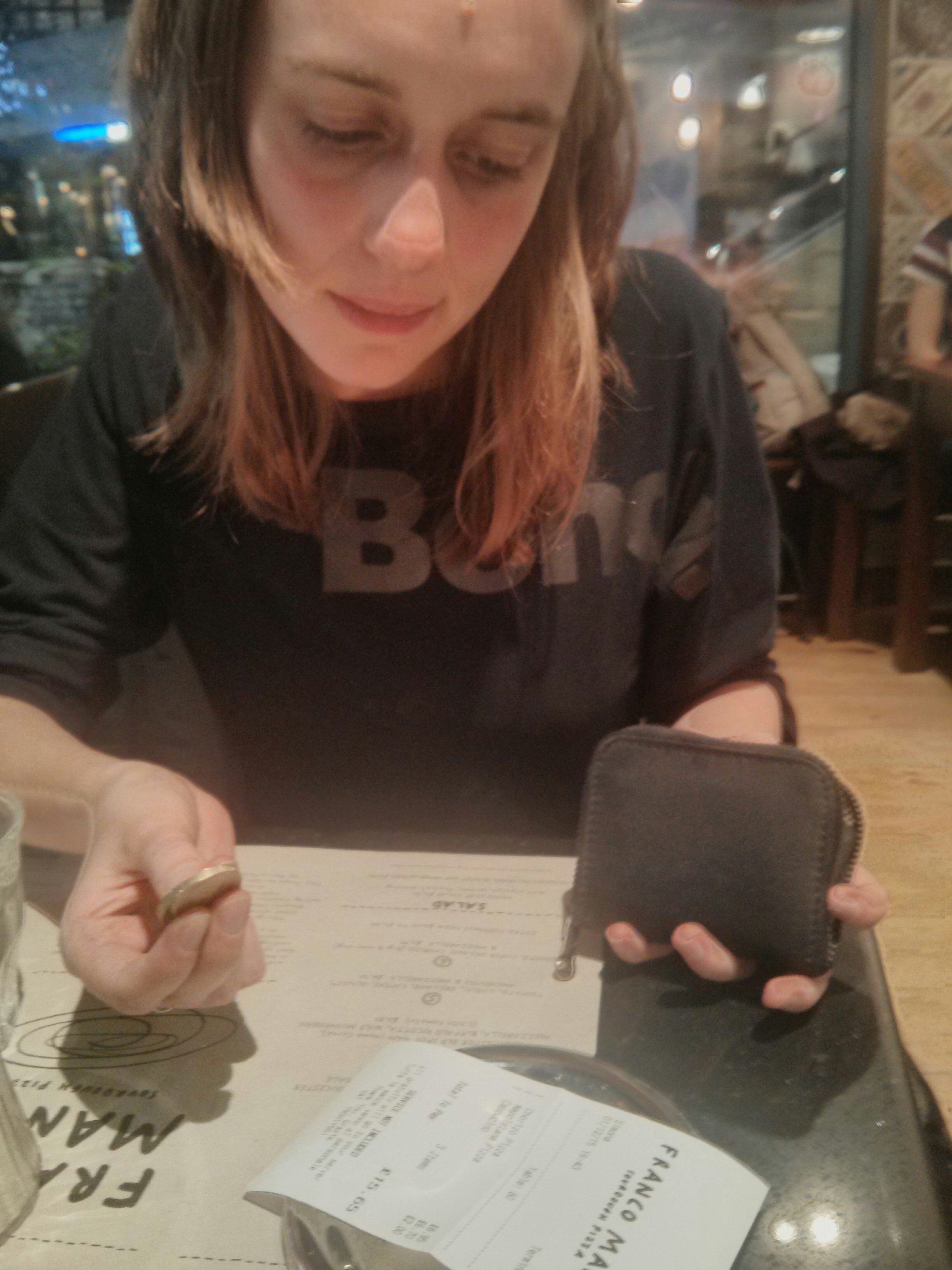To tip or not to tip?
A social dilemma you’re bound to fall into at some point is whether or not to tip – and how much! Tip too little and you risk the waiter chasing you down the street shouting abuse; tip too much and you might gravely offend the staff. Tipping customs vary all over the world, between different countries and regions (not to mention situations), so do your research before you travel!
How much should you tip?
In the USA, tipping is mandatory and fairly high, with 15-20% being expected. Service wages are fairly low, meaning people factor tips into their pay, and waiters will ask you where their tip is if you haven’t left one.
In the UK, tipping is more relaxed and is never really expected in a pub or cafe, or anywhere with self-service. In restaurants, 10% is usually expected, but if you feel the service was poor then you can express this by not leaving a tip.
Move into Romania, however, where 10% is also recommended (more if you’re really happy with the service), and not leaving a tip would be considered very rude: do not try to return to a restaurant where you didn’t leave a tip.
Drinking tips
In lots of countries in Europe, the traditional attitude towards tipping can be seen in the language: German ‘Trinkgeld’, Swedish ‘dricks’ and Danish ‘drikkepenge’ all mean ‘money for drinking’, as does the Slovak ‘prepitné’, French ‘pourboire’, Slovenian ‘napitnina’, Serbian ‘напојница’ and Croatian ‘napojnica’. The idea behind this is that you just round the bill up or leave a few coins, as a contribution towards a drink for the waiter.
Further East, the direct translation is even more specific: in Russia, you leave money ‘for tea’ (‘чаевые’). The same is true of Kazakh‘s ‘шайлық’ (шай- shai- tea’), Uzbek‘s ‘чойчақа’ and Tajiki‘s ‘чойпулӣ’).
Beware, however, that tipping practices have changed significantly and just a few coins often won’t cut it any more in these countries: be prepared for at least a 10% tip, as a broad guideline.
When not to tip
So far, the problem has only been how much to tip, and if you’ve accidentally tipped too much in America or Europe, it won’t cause any massive problems. But in some areas the attitude towards tipping changes drastically.
In Malaysia, Singapore and Japan tipping is not practised at all and could be considered odd or even offensive.
In Georgia, it can be seen as an affront to the notion of hospitality. Beware as well that a tip can easily be misconstrued as a bribe, which you definitely don’t want to get in trouble for, so make sure you look up before travelling whether tipping is normal practice in the country you’re visiting!
Have you ever been caught out by tipping etiquette?
Nat
How idioms help you make a language your own
When learning a new language we are happy to pass every little milestone: the first time you address a native speaker, the first conversation… All these achievements mean the world to us, they are the reward of our continuous learning. When becoming fluent in a language you can express almost everything you want to say, but there is still that one little step further, that gives your words something that make them yours. Something that gives them personality – and this can be achieved through the use of expressions and idioms.
Many idioms make no sense even if we know the meaning of each individual word! But some of them are easy to figure out, like for example ‘it takes two to tango’, meaning an action or activity that involves participation from more than one person.
To me they are very interesting and it gives me insight into the British culture. Not to mention the fun of using them in a conversation, possibly wrong sometimes but nevertheless entertaining! That is how I learned that when you’re ill you can be ‘a bit under the weather’ or to not take someone seriously is ‘taking it with a grain of salt’.
Sometimes expressions are international and can be directly translated through more languages without losing their meaning, like ‘a picture paints a thousand words’.
Learning the academic language is certainly the most important aspect when embarking on such a challenging journey. However, informal words, idioms, expressions and slang will bring you closer to the people you share the language with. It will make any conversation more pleasant and will allow you to put your own stamp on the vocabulary you are using.
How do I learn idioms?
The best way to find out which are the most used expressions, or the most popular ones, is to ask a native speaker, read local magazines and newspapers or watch local TV shows. My personal preference is to spot them in conversations and ask people what they mean.
For example, last week I learnt the expression ‘get the bit between the teeth’ from my boss. Which he also kindly explained (possibly because my face indicated that I had no clue what he was on about). The bit is a piece that goes inside a horse’s mouth and pushes against its soft parts, which causes it to turn. When the horse gets it between the teeth he takes control over from the rider and can’t be stopped. Pretty interesting, huh?
What are some funny or unusual idioms in your language?
Ioana
A couple of days in Berlin
After volunteering in a hostel in Riga for six weeks, I decided to take the long way home via a series of overnight buses. With everyone raving about how beautiful a city Berlin is, I decided to make it my next stop on my journey home.
It is easy to see why people like it so much.
I stayed in a huge hostel in the Turmstrasse area and this seemed like a really good location to stop in. Just twenty minutes away was the Victory Column, or Siegessäule, which overlooks a large portion of the city. A little further was Potsdamer Platz; the centre is all commercial with cafes and restaurants as far as the eye can see and business reaching high up into the sky from a series of highly polished skyscrapers. But the surrounding area has a lot of history and culture to offer too. Personally the Topography Of Terror, Holocaust Memorial, Friedrichstrasse and Reichstag were the things that grabbed my attention the most. An early evening stroll in the local neighbourhood turned into a several hour stint that saw me leave my hostel, walk the length of Turmstrasse, past the Victory Column, down to the Holocaust Memorial and back on my first night.
There is no one ‘centre’ to Berlin, but it seems most tourists and locals end up at Alexanderplatz. Walking out of the station the first thing you see is the iconic tower that overlooks a pedestrianised area. Walking behind this and into a little blissful shade after a journey on an overheated train was very refreshing. There is a lot to see from here, and I personally headed over towards the galleries and sat under the pillars looking out over the river for a while.
The Zoological Gardens are definitely worth a visit, and if you like zoos and aquariums then it is a must. There’s a very cute windmill of sorts that sits along a section of Budapester Strasse which is worth stopping at to admire.
The Brandenburg Gate was such an impressive sight first hand, you can really understand the sense of power there and the thought of those streets being lined with people waiting to see a glimpse of their leader is both disturbing and breathtaking.
The area around Nordbahnhof was one of my favourite places, full of gardens, interesting architecture, and of course the Berlin Wall Memorial.
The main station, Hauptbahnhof, was also worth looking round, whether you like trains or not. There are so many levels, platforms, different types of train, shops, places to eat and drink, you could spend hours within this huge complex and not get bored.
Of course, one of the best things about Berlin, from my perspective at least, is the cake. Much like Greggs back home in the UK, there is a bäckerei (bakery) wherever you turn, and such a choice of sweet and savoury treats it can be a little overwhelming.
I spent the best part of two days in Berlin and I have to say, it isn’t enough. I could have happily stayed another week and I am still not sure if that would have been enough to have seen everything that I wanted to. A return trip is definitely in order!
Kelly
Planning a trip to Berlin? Remember to learn a little German before you leave with uTalk – or try our free Talk Now demo.
Breaking the ice: overcoming language nerves
So apparently a quarter of Brits are nervous about speaking another language when they’re abroad, and 40% of us are embarrassed by our language skills.
These conclusions come from a study by the British Council, which surveyed 2,000 British adults. While 67% of respondents believed it’s important to learn a few words of the local language before a trip, it seems not many of us are putting that into practice when we actually get there.
What if?
There are a number of very legitimate reasons for this fear:
‘What if I get it wrong and everyone laughs at me?’
‘What if I say my bit perfectly, but then don’t understand the response?’
‘What if they just don’t understand what I’m trying to say?’
‘What if I open my mouth and my mind goes blank?’
We all hate the idea of making a fool of ourselves, and it doesn’t help that the Internet is full of stories about people who said ’embarazada’ (pregnant) when they meant to say ’embarrassed’. (Probably more embarrassing than the thing you were embarrassed about in the first place, ironically.) But how many of those people would make the same mistake again? I’m guessing zero.
It sounds like a cliché, but sometimes making a mistake really is the best way to learn. And in my experience, even if you do get things wrong, and even if people laugh, it won’t be mean laughter – and they’ll probably go out of their way to explain where you went wrong, so you know for next time.
Most likely, whoever you’re speaking to will probably be pleasantly surprised that you gave it a try in the first place; in most countries, not much is expected of British or American visitors, so any time we make the effort, it’s appreciated. (Just look at the response to Mark Zuckerberg speaking Mandarin – even though he was very hesitant, and made lots of mistakes, the audience loved it.)
What’s the point?
But at least feeling anxiety over speaking another language shows an interest in trying, and a desire to get it right; the fear of making mistakes is what’s holding us back. The far bigger problem is the number of people who believe there’s no point at all in learning another language, because ‘everyone speaks English’, ‘every time I try, people reply to me in English’ and ‘just knowing a few words won’t help’.
It’s true – last year, when I visited Italy, everyone could tell instantly that I was British, and even if I started a conversation in Italian, they would generally reply to me in English. But here’s the thing: though it’s very easy to seize that lifeline and lapse back into English, you don’t have to. I had very little Italian, but I was determined not to give up, even though the opportunity was there – and the waiters and shop staff I was trying to speak to soon caught on and reverted to Italian. Our conversations mostly consisted of one-word sentences, but at least they were Italian words, and we were able to understand each other. And I was pretty proud of myself afterwards – much more than I would have been if I’d had the same conversation in my native language.
 As for everyone speaking English, that’s clearly not true – and it shouldn’t matter anyway. The comments on the BBC article about the British Council study show that we expect those who visit the UK to speak English – so why should it be any different when we travel to another country? Even if you don’t need to learn a language, does that mean you shouldn’t?
As for everyone speaking English, that’s clearly not true – and it shouldn’t matter anyway. The comments on the BBC article about the British Council study show that we expect those who visit the UK to speak English – so why should it be any different when we travel to another country? Even if you don’t need to learn a language, does that mean you shouldn’t?
And finally, it’s true that knowing a few words wouldn’t help you if you had to go and close a business deal in French, or teach maths in China. But if you’re just going on holiday for a week, the chances are that as long as you’re able to check in to your hotel, order a meal and buy a bus ticket, you’re probably covered – though of course it will depend where you’re travelling to.
This, of course, is the whole idea that uTalk is built on. Because sometimes, just being able to say hello in another language is enough to make someone smile. And why wouldn’t we want to do that?
So let’s be bold, and show off our language skills. And let’s see if we can bring those percentages down in time for the next study.
Liz
5 great songs to help you learn English
Everyone knows the key to language learning is immersion, but upping sticks and moving to the country where your language originates from is a huge commitment and not always possible.
However. There are a few things you can do to help your learning along. Watching films (with or without subtitles, depending on how brave you are), reading an online magazine or newspaper entirely in the language you’re trying to learn, and if you’re really fearless, try changing the language on all your devices – phone, tablet, computer and so on. Just be sure you know enough words to change it back.
 My personal favourite way though, which I actually use myself when I am learning, is to listen to music. There is no quicker way to immerse yourself in a language, learn pronunciation, subject word order, vocabulary, colloquialisms, hidden meanings and double entendres, and so on. The list is technically endless and completely adaptable to whatever level you are.
My personal favourite way though, which I actually use myself when I am learning, is to listen to music. There is no quicker way to immerse yourself in a language, learn pronunciation, subject word order, vocabulary, colloquialisms, hidden meanings and double entendres, and so on. The list is technically endless and completely adaptable to whatever level you are.
Here are my five favourite English songs that I use in class with my students; what would you add to the list?
Passenger – Let Her Go
This song is perfect for learning English. The song is played just about everywhere so it’s instantly recognisable, the pace is not slow enough to make you feel daft but not so quick as to make you feel lost, and the most important thing is that Mike Rosenberg, the singer and face of Passenger, has a beautiful, clear voice that not only is nice to listen to but easy to understand.
Coldplay – The Scientist
Another really good song for learning. Clear lyrics, slow pace, understandable voice, (thanks, Chris Martin), and an interesting video to talk or think about once you know all the words. Resultant group discussions have included trains, drinking and driving, graffiti, and the environment. Watch the video if you’re not sure why.
Snow Patrol – Chasing Cars
What is good about this one is not so much the pace of the song but the simplicity of the lyrics. The verses are really short, and Gary Lightbody’s pronunciation on this one is a gentle exposure to the Irish accent in song. If you choose this song as one of the first to learn with, you’ll feel a real sense of achievement quickly because it’s such a simple one to learn.
Muse – Feeling Good
Music trivia for you first: did you know that this song was first written by Anthony Newley and Leslie Bricusse for the 1965 musical The Roar of the Greasepaint and has been covered by, amongst others, Nina Simone, Sammy Davis Jr and Michael Bublé? I have chosen the Muse version because I personally love Muse, plus Matt Bellamy’s voice on this one is slightly harder than my previous suggestions. Why is this a good thing? Well, the song is very recognisable and most people have heard at least one version of it, so when you hear this version you’ll likely know some of the lyrics already and will be exposed to yet another accent – and you’ll understand it. Bonus!
Maximo Park – Acrobat
I am a mean teacher. Or I can be. So when I am presented with a student who says they can understand all English lyrics and I know otherwise, I give them this track to try. Because all the verses on this track are spoken, which sounds easy, doesn’t it? It’s not. The beautiful Paul Smith is from Teeside, so firstly we have the exposure to the accent and secondly, he doesn’t speak slowly at all. By the time you get to the first chorus you’ll probably throw your pen down in relief and look at your paper in alarm with the five words you’ve managed to scribble down. But it’s worth it. I promise.
If you’re not sure how to use music to learn a language, here’s my ‘how to’:
- Choose a song and listen to it a couple of times.
- Listen again and start writing down the lyrics that you recognise. Repeat as often as your patience allows.
- Look up the lyrics, either with something like AZLyrics or Lyric Translate, the latter of which will actually have your lyrics and the translated version side by side.
- Watch a lyric video so you can see the words whilst you hear them. Singing is optional but hey, why not?
Sound easy? Give it a go!
Kelly





